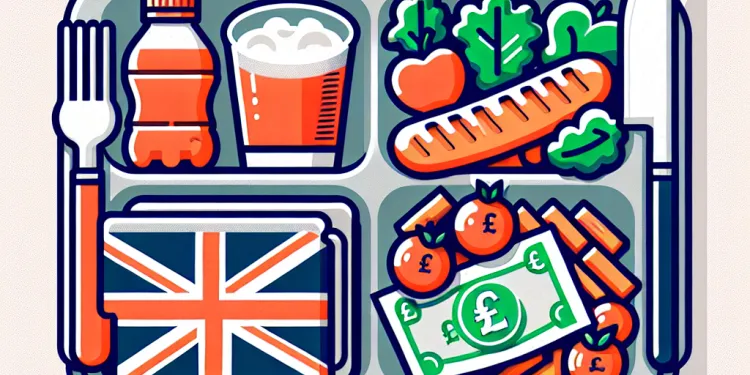
Find Help
More Items From Ergsy search
-
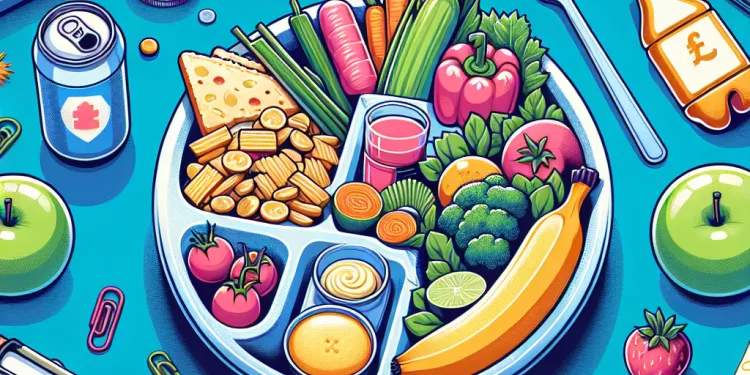
How are school meals provided in the UK?
Relevance: 100%
-
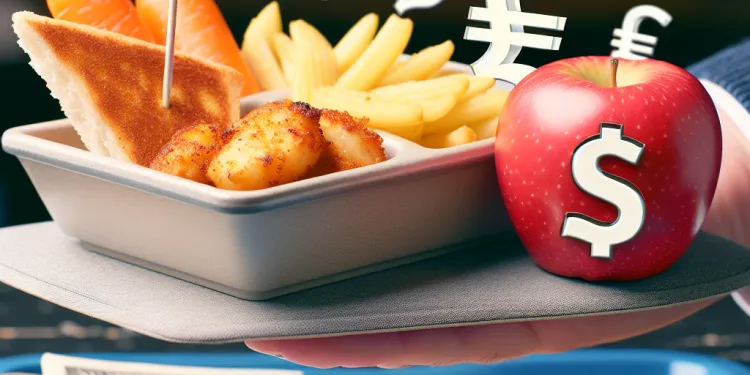
What is the average cost of a school meal in the UK?
Relevance: 97%
-

Who is responsible for providing school meals in the UK?
Relevance: 97%
-

Are school meals free for all students in the UK?
Relevance: 96%
-

Are school meals inspected for quality and standards?
Relevance: 96%
-

What is the purpose of providing school meals in the UK?
Relevance: 96%
-
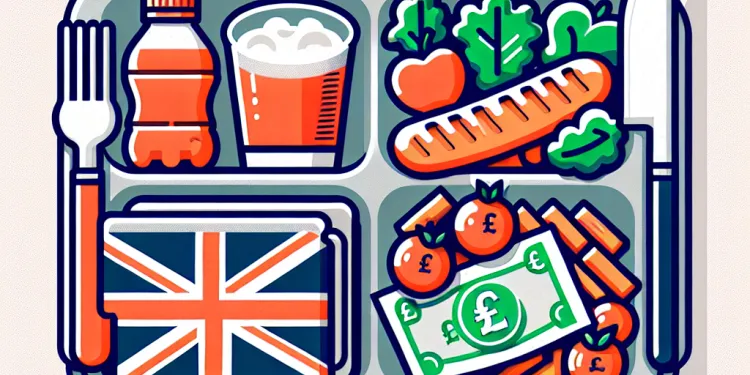
What is included in a typical school meal in the UK?
Relevance: 95%
-
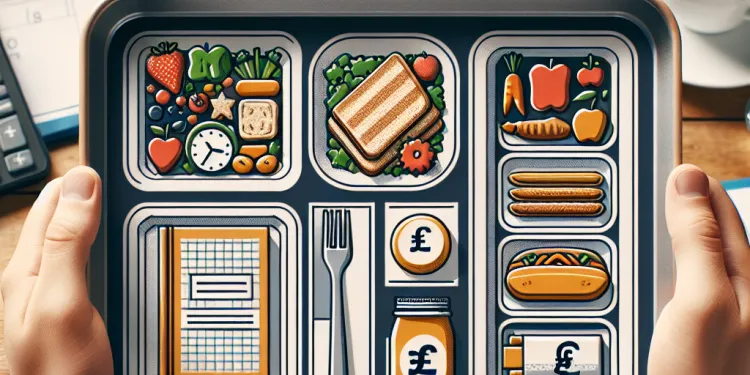
Are there educational components to the school meal program?
Relevance: 93%
-

Who provides the funding for free school meals in the UK?
Relevance: 93%
-
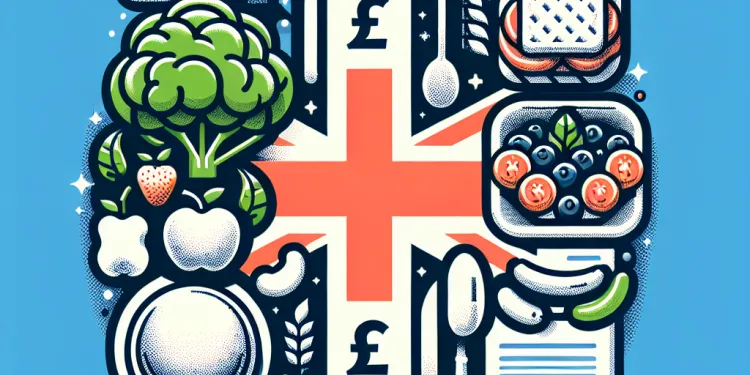
Are vegetarian or vegan options available in UK school meals?
Relevance: 92%
-
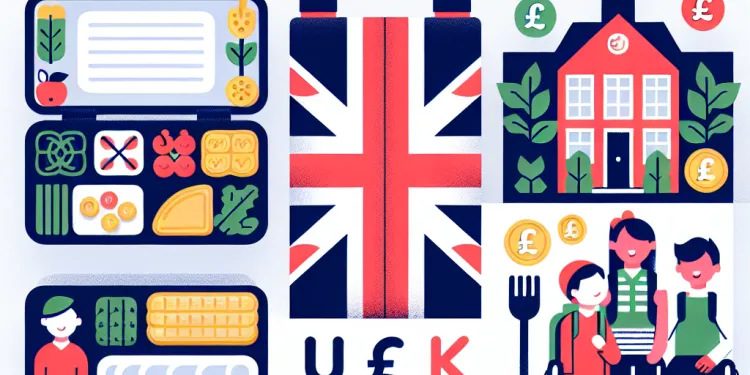
Can children with disabilities access school meals?
Relevance: 91%
-
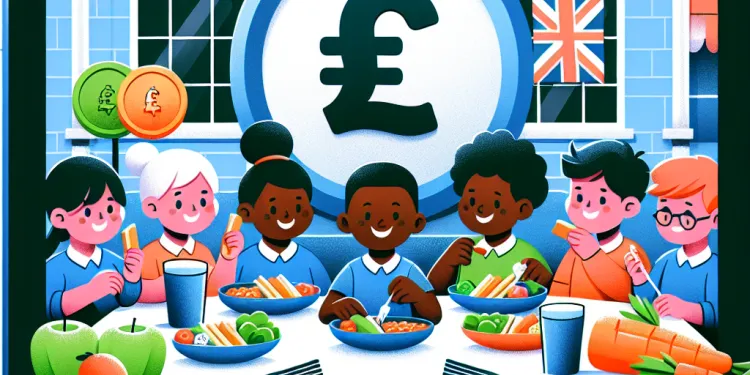
How can parents provide feedback on school meals?
Relevance: 89%
-
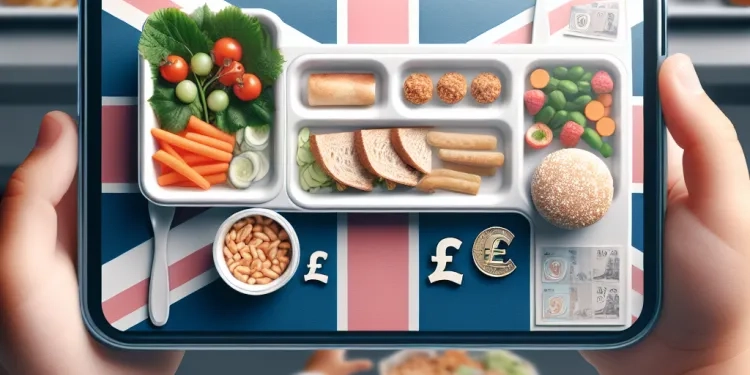
How are special dietary requirements catered for in school meals?
Relevance: 88%
-

What measures are taken to ensure food safety in school meals?
Relevance: 84%
-

What criteria must be met for a child to be eligible for free school meals?
Relevance: 84%
-
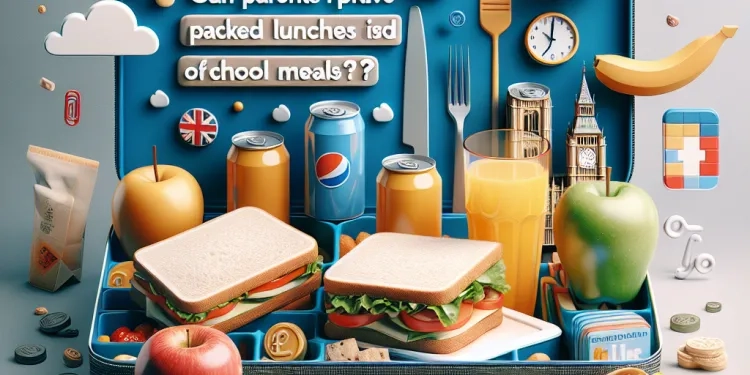
Can parents provide packed lunches instead of school meals?
Relevance: 82%
-

Is there a focus on healthy eating in UK school meals?
Relevance: 73%
-

Ministers to Debate Extension of Free School Meals for Low-Income Families
Relevance: 62%
-

What time are meals served?
Relevance: 57%
-
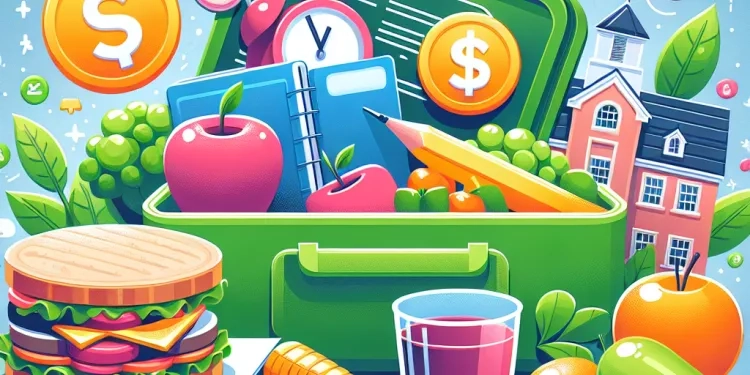
Calls for Better School Lunch Standards After Nationwide Survey
Relevance: 55%
-

See4School
Relevance: 53%
-

Are there any initiatives to reduce food waste in schools?
Relevance: 53%
-

How are school meal providers selected?
Relevance: 51%
-

How are food allergies managed in UK schools?
Relevance: 49%
-
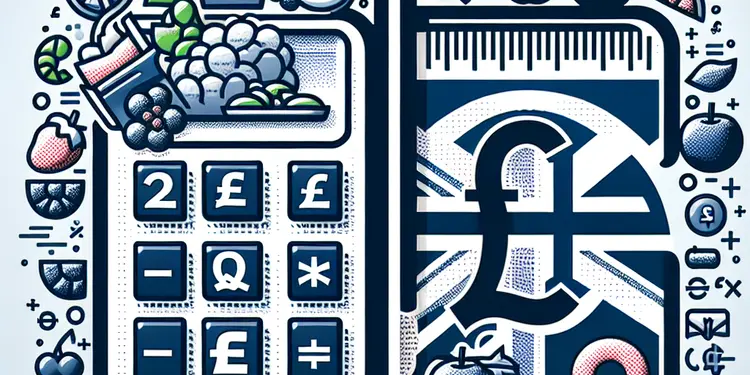
How can I calculate the fat content in my meals?
Relevance: 47%
-

Do SEND children attend mainstream schools?
Relevance: 45%
-

Do school meals include both hot and cold options?
Relevance: 45%
-

What is the SENCO's role in a school?
Relevance: 44%
-

What role do schools play in managing concussions?
Relevance: 43%
-

Are there specific laws governing SEND in schools?
Relevance: 43%
-

What happens to my loans if I go back to school?
Relevance: 43%
-

What support is available for SEND children in schools?
Relevance: 42%
-

Can I go to work or school if I have norovirus?
Relevance: 42%
-

What role do schools play in supporting the social media ban?
Relevance: 41%
-

Calls to Ban Vapes Near School Grounds Gain Momentum
Relevance: 40%
-

How can schools create an inclusive environment for SEND children?
Relevance: 40%
-

Joint School - Knee Exercises
Relevance: 36%
-

What support is available outside of school for SEND children?
Relevance: 33%
-

Joint School - Hip Exercises
Relevance: 32%
-

New Government Benefits for Low-Income Families
Relevance: 31%
Introduction to School Meals in the UK
In the United Kingdom, school meals are an integral part of the education system, providing children with the nutrition they need to support their learning and development. These meals are designed to adhere to strict nutritional guidelines set by the government to ensure that they are both healthy and balanced.
Components of a Typical School Meal
A typical school meal in the UK is composed of several key components to ensure it is nutritionally balanced. These components generally include a main course, a side, a portion of vegetables or salad, a drink, and sometimes a dessert. The emphasis is on offering a variety of foods that cover the major food groups, ensuring that children receive the necessary nutrients to thrive.
Main Course and Protein
The main course typically consists of a protein source, which can include options such as chicken, fish, beef, lamb, or vegetarian alternatives like tofu, legumes, or eggs. The choice of protein is important as it provides essential amino acids required for growth and repair of tissues. Schools often provide a vegetarian option to cater to diverse dietary needs.
Carbohydrates and Side Dishes
A portion of carbohydrates accompanies the main course to provide energy. Common options include potatoes (boiled, mashed, or baked), whole grain pasta, rice, or wholemeal bread. These carbohydrates are chosen to release energy slowly throughout the day, aiding in concentration and sustained energy levels for children.
Vegetables and Salad
Vegetables and salads are vital components of a school meal, offering essential vitamins, minerals, and fiber. Schools make an effort to incorporate a variety of vegetables, ranging from traditional choices like carrots and peas to more diverse options such as spinach or sweet corn. A salad bar might also be available, allowing children to select their preferred vegetables and promote healthier eating habits.
Desserts and Drinks
While desserts are typically offered, they are designed to be nutritious. Examples might include fruit salads, yogurts, and occasionally baked goods that use wholemeal flour and reduced sugar. Drinks provided are usually milk or water, with sugary beverages being limited or discouraged to reduce sugar intake and promote dental health.
Nutritional Standards and Guidelines
The UK government sets nutritional standards for school meals to combat issues such as childhood obesity and malnutrition. These guidelines ensure meals contain appropriate levels of vitamins, minerals, and macronutrients. Schools are encouraged to limit foods high in salt, sugar, and saturated fat, aligning with broader public health objectives.
Conclusion
In conclusion, a typical school meal in the UK is a well-rounded offering aimed at providing essential nutrients for growing children. By including a balance of proteins, carbohydrates, vegetables, and controlled desserts and drinks, these meals support not only the physical health of children but also their academic performance and overall well-being.
Introduction to School Meals in the UK
In the UK, school lunches are very important. They give children the food they need to learn and grow. The meals must meet rules set by the government to make sure they are healthy and balanced.
What is in a School Meal
A school meal in the UK has different parts to make sure it is healthy. These parts usually include a main dish, a side dish, some vegetables or salad, a drink, and sometimes a dessert. The idea is to offer different foods that cover all the food groups children need to grow strong and healthy.
Main Dish and Protein
The main dish usually has a protein like chicken, fish, beef, lamb, or vegetarian choices like tofu, beans, or eggs. Protein is important because it helps the body grow and fix itself. Schools often have a vegetarian choice to meet the needs of all children.
Carbohydrates and Side Dishes
The meal includes a carbohydrate side dish to give energy. This can be potatoes (boiled, mashed, or baked), whole grain pasta, rice, or brown bread. These foods give energy slowly so children can stay focused and energetic all day.
Vegetables and Salad
Vegetables and salads are very important in a school meal because they give vitamins, minerals, and fiber. Schools try to offer different vegetables like carrots, peas, spinach, or sweet corn. Some schools have a salad bar where children can choose the vegetables they like, to encourage healthy eating.
Desserts and Drinks
Desserts are usually offered, but they are made to be healthy. They might include fruit salads, yogurts, or sometimes cakes made with wholemeal flour and less sugar. Kids usually get milk or water to drink, and sugary drinks are limited to keep teeth healthy and reduce sugar intake.
Nutritional Standards and Guidelines
The UK government sets rules for school meals to help fight problems like child obesity and poor nutrition. These rules make sure the food has enough vitamins, minerals, and other important nutrients. Schools try to use less salt, sugar, and unhealthy fats, following health guidelines.
Conclusion
In summary, a school meal in the UK is carefully made to give kids the nutrients they need to grow. By offering a balance of proteins, carbohydrates, vegetables, and carefully chosen desserts and drinks, these meals help children's health, learning, and overall well-being.
Frequently Asked Questions
What is typically included in a UK school meal?
A typical UK school meal usually includes a main course, a side dish, a dessert, and a drink.
Are vegetables included in a UK school meal?
Yes, UK school meals often include a portion of vegetables or salad.
Do UK school meals offer vegetarian options?
Yes, most schools in the UK provide vegetarian options in their meal plans.
Is fruit available in UK school meals?
Yes, fruits are commonly included as a dessert or a side option in UK school meals.
Do UK school meals cater to dietary restrictions?
Many schools in the UK accommodate dietary restrictions, including allergies and religious preferences.
What types of drinks are provided in UK school meals?
Drinks such as water, milk, or fruit juice are typically offered with UK school meals.
Are there portions of meat in UK school meals?
Yes, meat options are often available, though vegetarian alternatives are also offered.
How do UK school meals ensure nutritional balance?
UK school meals follow government guidelines to include a balanced mix of protein, carbohydrates, and fiber.
Do UK school meals include desserts?
Yes, a dessert such as yogurt, fruit, or a pastry is usually part of the meal.
Are UK school meals prepared on-site?
Many UK schools have on-site kitchens where meals are freshly prepared.
Do school meals in the UK include sandwiches?
While hot meals are standard, sandwiches may be available as an alternative.
Are UK school meals free for all students?
Primary school students in certain age groups can receive free school meals, and there are eligibility criteria for others.
How are UK school meals funded?
UK school meals can be funded by the government, especially for younger children and those eligible for free meals.
How often do UK school menus change?
Menus may change seasonally or weekly to offer variety and utilize seasonal produce.
Are special diets like gluten-free accommodated in UK school meals?
Yes, many schools offer options for students requiring gluten-free meals or other special diets.
Do UK school meals include fish?
Fish is often featured in UK school meals, in line with nutritional guidelines.
Can parents see the school meal menu?
Yes, schools usually provide meal menus to parents, sometimes accessible online.
Are snacks included in UK school meals?
Snacks are generally not part of the main meal, but some schools may offer healthy snack options.
Are UK school meals healthy?
UK school meals are designed to meet nutritional standards set by the government, focusing on health and balanced diets.
Are cultural food preferences considered in UK school meals?
Many UK schools make efforts to include culturally diverse meal options to cater to various student backgrounds.
What is in a UK school meal?
In the UK, a school meal often has:
- Main food: This could be pasta, rice, or a sandwich.
- Vegetables: Like carrots or peas.
- Fruit: An apple, banana, or orange.
- Drink: Water or milk.
- Dessert: A small cake or yogurt.
Using pictures can help you understand school meals better.
A school lunch in the UK usually has a main food, a side food, a dessert, and a drink.
Do school lunches in the UK have vegetables?
Yes, school lunches in the UK usually have vegetables.
If you want help reading or understanding this, you can:
- Ask a teacher or friend to help explain.
- Use picture cards to see what vegetables look like.
- Listen to the words using a reading app.
Yes, school lunches in the UK often have some vegetables or salad.
Do UK school meals have vegetarian choices?
Some schools in the UK give vegetarian meals. This means meals with no meat. Ask your school what they have. If you need help reading menus, ask someone or use a text-to-speech tool to read it aloud.
Yes, most schools in the UK have vegetarian meals for lunch.
Can kids get fruit with school lunches in the UK?
Yes, fruits are often part of school meals in the UK. They can be eaten as a dessert or on the side.
Do UK school meals meet special diet needs?
Some kids need special food. This could be because of health, religion, or preference. UK schools try to give food for everyone.
- Some kids can't eat certain foods like nuts, milk, or eggs. Schools try not to serve these.
- Some kids eat different foods for religion. Schools try to have choices for them.
- Some kids don't eat meat, and schools try to have meals for them too.
Parents can talk to schools to help them understand what their kids need. You can also ask the school for a menu to see what they offer.
Ask the school if you need more help with special foods.
Lots of schools in the UK can help with food needs, like allergies and what people eat for their religion.
What drinks do you get with school meals in the UK?
In schools in the UK, you can choose from different drinks with your meal. Here are some drinks you might get:
- Water: You can always have water.
- Milk: There is often milk. It can be white or sometimes flavored.
- Juice: There might be fruit juice, like orange or apple juice.
If you need help reading, you can:
- Ask a teacher or friend to read with you.
- Use picture cards to help remember the drinks.
In UK schools, kids usually get drinks like water, milk, or fruit juice with their meals.
Do UK school meals have meat?
UK school meals often have meat like chicken, beef, or fish. If you do not eat meat, you can ask for other food. You can talk to your teacher or the school cook.
Using pictures or asking for help can make it easier to understand what meals are available.
Yes, you can usually get meat. If you don't eat meat, there are other choices too.
How do UK school meals make sure they are healthy?
UK school meals are made to be good for you. They have rules to make sure every meal gives you the right nutrients. Nutrients are things in food that help you grow and stay healthy.
Here are some things they do to make sure the meals are healthy:
- Balanced Meals: Meals have a mix of fruits, vegetables, proteins, and grains to give your body what it needs.
- Less Sugar and Salt: Meals have less sugar and salt to keep you healthy.
- Healthy Options: There are options like whole grains and fresh fruits to choose from.
If you find it hard to understand food labels or want to learn more about nutrition, you can ask for help from a teacher or use online tools to learn more.
UK school meals follow special rules. They need to have a good mix of foods like protein, which is in meat and beans, carbohydrates like bread and rice, and fiber which is in fruits and vegetables.
Support: You can use pictures of different foods to help understand. Also, talking about meals with a teacher or friend can help too!
Do UK school meals have desserts?
In the UK, when kids eat lunch at school, do they get a sweet treat at the end? This could be something like cake, fruit, or yogurt. To help understand, look at pictures of school lunches or ask your teacher. You can also talk with friends about what desserts they have at school. Remember to ask if you're not sure!
Yes, you can have something sweet like yogurt, fruit, or a pastry after your meal.
Do UK schools make meals at school?
Many schools in the UK have kitchens right in the school where they make fresh meals.
Do schools in the UK give sandwiches for lunch?
In the UK, schools often give lunches to students. Sometimes these lunches have sandwiches. You can ask the school to know more.
If you want help reading, you can:
- Use a friend or family member to read with you.
- Use a dictionary to understand words.
- Listen to an audiobook that talks about school meals.
Normally, you get a hot meal, but you can choose a sandwich instead if you want.
Do all children in UK schools get free meals?
Some kids in primary school can have free lunches. There are some rules to decide who gets them.
Who pays for school meals in the UK?
School meals in the UK are paid for by the government and parents.
Here is how it works:
- Some children get free meals. The government pays for these.
- Other children need to pay. Their parents give money for the meals.
If you find it hard to read, you can:
- Ask someone to read it with you.
- Use a tool that reads text out loud.
In the UK, the government sometimes pays for school meals. This is often for young children and kids who need free meals.
How often do UK school menus change?
How many times do school menus in the UK change?
Schools might change their menus each term.
That's about three times a year: Autumn, Spring, and Summer.
Sometimes, they might change the menu more often.
Schools want to give students different food.
They try to make meals healthy and tasty.
If you want help reading, you can use tools to read out loud.
Menus can change every season or each week. This helps to keep things different and uses fruits and veggies that are in season.
Do UK schools offer special meals like gluten-free?
UK schools can give special meals. They can make gluten-free food. This helps kids who can't eat some things. It's good to talk to your school. Tell them what your child needs.
Some schools have people who help with food. They can answer questions. You can ask for help if you're not sure what to do.
Yes, many schools have special meals for students who can't eat gluten or need different foods.
Do Schools in the UK Serve Fish for Lunch?
Do schools in the UK give fish for lunch? Let's find out!
Some schools in the UK might serve fish as part of their meals. It can be fish fingers or fish cakes. But not all schools are the same.
If you want to know more, you can:
- Ask your teacher or the school cook what is on the menu.
- Check the school menu. It might be written down or on the school website.
This can help you know if you will have fish at school.
Fish is often part of school meals in the UK. It is good for you and matches the healthy eating rules.
Can parents look at the school lunch menu?
Yes, parents can look at the school lunch menu. It's important to know what children eat at school.
Here are some ways parents can see the menu:
- Visit the school website. Many schools show the menu there.
- Ask the school office. They might give you a paper copy.
- Check for emails or letters from the school with menu information.
If you have questions about the menu, ask the school. They can help you understand what food is served.
Schools usually give meal menus to parents. Sometimes, you can see them on the internet.
Do UK school meals have snacks?
Snacks are not usually part of lunch or dinner, but some schools might have healthy snacks you can eat.
Is the food at UK schools good for you?
The food that schools serve is important to help kids grow strong and healthy.
Some schools give healthy meals like fruits and vegetables. But, not all schools do this.
Good food helps you learn better and have energy for the day.
If you want to know more, you can ask a teacher about the food at your school.
Using pictures or symbols can help you understand better what foods are healthy.
School meals in the UK are made to be healthy with a good mix of foods. The government makes rules to keep these meals good for your body.
Do UK schools think about different cultures when making school lunches?
Lots of schools in the UK try to have different foods from around the world. This is to make sure all students feel included and happy with the meals.
Here are some ideas to help understand this better:
- Look at pictures of different foods from around the world.
- Try tasting new foods with your family.
- Ask friends about their favorite meals from their cultures.
Useful Links
This website offers general information and is not a substitute for professional advice.
Always seek guidance from qualified professionals.
If you have any medical concerns or need urgent help, contact a healthcare professional or emergency services immediately.
Some of this content was generated with AI assistance. We’ve done our best to keep it accurate, helpful, and human-friendly.
- Ergsy carfully checks the information in the videos we provide here.
- Videos shown by Youtube after a video has completed, have NOT been reviewed by ERGSY.
- To view, click the arrow in centre of video.
- Most of the videos you find here will have subtitles and/or closed captions available.
- You may need to turn these on, and choose your preferred language.
- Go to the video you'd like to watch.
- If closed captions (CC) are available, settings will be visible on the bottom right of the video player.
- To turn on Captions, click settings .
- To turn off Captions, click settings again.
More Items From Ergsy search
-

How are school meals provided in the UK?
Relevance: 100%
-

What is the average cost of a school meal in the UK?
Relevance: 97%
-

Who is responsible for providing school meals in the UK?
Relevance: 97%
-

Are school meals free for all students in the UK?
Relevance: 96%
-

Are school meals inspected for quality and standards?
Relevance: 96%
-

What is the purpose of providing school meals in the UK?
Relevance: 96%
-

What is included in a typical school meal in the UK?
Relevance: 95%
-

Are there educational components to the school meal program?
Relevance: 93%
-

Who provides the funding for free school meals in the UK?
Relevance: 93%
-

Are vegetarian or vegan options available in UK school meals?
Relevance: 92%
-

Can children with disabilities access school meals?
Relevance: 91%
-

How can parents provide feedback on school meals?
Relevance: 89%
-

How are special dietary requirements catered for in school meals?
Relevance: 88%
-

What measures are taken to ensure food safety in school meals?
Relevance: 84%
-

What criteria must be met for a child to be eligible for free school meals?
Relevance: 84%
-

Can parents provide packed lunches instead of school meals?
Relevance: 82%
-

Is there a focus on healthy eating in UK school meals?
Relevance: 73%
-

Ministers to Debate Extension of Free School Meals for Low-Income Families
Relevance: 62%
-

What time are meals served?
Relevance: 57%
-

Calls for Better School Lunch Standards After Nationwide Survey
Relevance: 55%
-

See4School
Relevance: 53%
-

Are there any initiatives to reduce food waste in schools?
Relevance: 53%
-

How are school meal providers selected?
Relevance: 51%
-

How are food allergies managed in UK schools?
Relevance: 49%
-

How can I calculate the fat content in my meals?
Relevance: 47%
-

Do SEND children attend mainstream schools?
Relevance: 45%
-

Do school meals include both hot and cold options?
Relevance: 45%
-

What is the SENCO's role in a school?
Relevance: 44%
-

What role do schools play in managing concussions?
Relevance: 43%
-

Are there specific laws governing SEND in schools?
Relevance: 43%
-

What happens to my loans if I go back to school?
Relevance: 43%
-

What support is available for SEND children in schools?
Relevance: 42%
-

Can I go to work or school if I have norovirus?
Relevance: 42%
-

What role do schools play in supporting the social media ban?
Relevance: 41%
-

Calls to Ban Vapes Near School Grounds Gain Momentum
Relevance: 40%
-

How can schools create an inclusive environment for SEND children?
Relevance: 40%
-

Joint School - Knee Exercises
Relevance: 36%
-

What support is available outside of school for SEND children?
Relevance: 33%
-

Joint School - Hip Exercises
Relevance: 32%
-

New Government Benefits for Low-Income Families
Relevance: 31%


